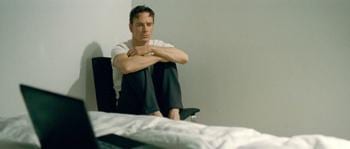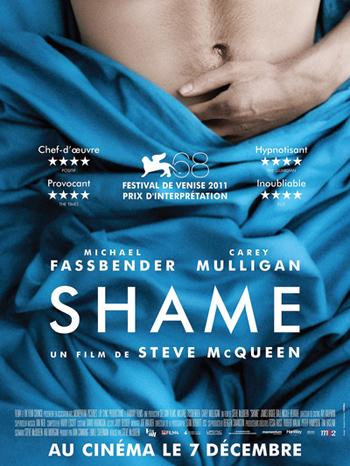One of the most hyped movies of the year, Shame is the eagerly anticipated follow-up to British filmmaker Steve McQueen’s 2008 directorial debut Hunger. Many critics are praising Shame for the same slick style McQueen showed with his first film and for star Michael Fassbender’s well-endowed performance, but for a gay critic, it represents a unique insight into the fascinating world of the heterosexual.
In Shame, Fassbender plays a man who works in an office. His role isn’t determined in any detail, but he’s a salesman of some sort, and he seems to be good at what he does. He also masturbates a lot, watches a lot of porn on his laptop, has sex in an alley with someone he’s just met and enjoys sex with prostitutes.
Okay, so here’s the kicker, and it’s a tough one, so brace yourself: this movie leads audiences to assume there’s something wrong with Fassbender. Isn’t that crazy? I mean, as a filmgoer, I’m willing to suspend my disbelief for just about anything – aliens from another planet, John Travolta playing a heterosexual, Drew Barrymore playing a virgin – but the idea that Fassbender’s shagadelic lifestyle is somehow an indication that he’s a total basketcase is a bit hard to swallow. (When you see Fassbender in full-frontal-nude glory you’ll understand my difficult-to-swallow reference.)
According to the film’s internal logic, Fassbender suffers from sex addiction. This is a condition akin to alcoholism or substance addiction, whereby victims are bound by a compulsive need for sex with as many people as possible. It gets even stranger; some argue the very notion of sex addiction is bunk, but the topic recently graced the cover of Newsweek, so there must some credence to it . . . or could it be Newsweek was just tying a purported social/sexual issue into a hit movie to draw prurient readers? Here, it ties into a series of other maladies: Fassbender’s character has trouble connecting emotionally with those he’s fucking. And when his sister shows up in need of a place to stay, he’s put off by her presence because she interferes with his bang-anything-that-moves modus operandi. There are hints that the two had a traumatic childhood – in New Jersey, no less – that has made them the emotional runts that they are.
If there’s one organization I don’t have a whole lot of time for it’s GLAAD, the US gay/lesbian media watchdog group that goes around tut-tutting people for how they represent queer people. They bother me precisely because the idea of someone preaching to others about the correct way to represent something is stifling, PC, boring and borders on its own form of censorship. Two cases in point: GLAAD spoke out against Basic Instinct before anyone even saw the film based solely on the script, which indicated that Sharon Stone’s character is a bisexual (horrors!) killer. They also raised alarm bells about Brüno. Those two instances alone should have finally destroyed GLAAD’s credibility. But just out of curiosity, I’ll be intrigued to see what – if any – reaction the group has to Shame. I sat there in the theatre wondering if I should be offended as I watched one of the film’s principal plots unfold: we learn that Fassbender has hit rock bottom – wait for it – when he goes into a gay club and lets a lucky dude go down on him. We know this is supposed to mark some kind of a low point, as the über-dramatic music swells even higher than Fassbender’s erection.
McQueen’s film is getting praise for what I suspect are a lot of the wrong reasons. It purports to illuminate an issue that is still somewhat mysterious but also involves sex, so it gets people talking. Shame is shot in a very arty way, so people are under the assumption they’re watching something terrifically high-brow, so they’d better buck up and like it. I’d write that the emperor isn’t wearing any clothes, but that would simply be a cheap line in a film notorious for its nudity, so I won’t degrade myself as a critic by doing so.
I’m certainly open to the idea that some people use recreational sex as a means of not facing up to various emotional issues, but I often found Shame a bit maddening in its simplicity. It insinuates that sluts must somehow be emotionally damaged, or are in what Freud referred to as an arrested stage of development. Sex radicals would argue that we should all get over ourselves, give up on notions of monogamy – we shouldn’t confuse our partners with property, after all – and that casual sex is not only benign, it can actually be a beneficial part of someone’s existence.
As for the raging debate between those who argue for settling down with a nice partner as opposed to slutting about like Lindsay Lohan on speed, queer filmmakers have already delved into such territory, most notably in German filmmaker Frank Ripploh’s autobiographical 1980 feature Taxi zum Klo (Taxi to the Toilet). In that movie, Ripploh stars as a gay man conflicted by the needs of his committed boyfriend and the demands of a very active sex life with multiple, often anonymous lovers. It is, notably, a pre-AIDS movie. Congrats, straight film world; you’re only 31 years behind.
But despite some of my misgivings, McQueen does have an undeniable talent. The way he shoots is complex and intriguing: he takes sexy, photogenic actors and makes their sex scenes seem decidedly non-erotic. And given how appealing these actors are, that’s no small feat. He’s also taken a page from the French filmmaking handbook, showing us what appears to be actual sex. That’s a rarity in British and American films, in which agents dissuade their star-system clients from such tawdry acts. But Shame prompts the question: is sex with people you don’t know really such a bad thing? I’d like to send a little memo to McQueen: not only is sex with people you don’t know quite fun, you should really try having sex with people you flat-out hate – now that’s hot!
McQueen could take a lesson from another het filmmaker. In Woody Allen’s 1975 comic masterpiece Love and Death, Diane Keaton says, “Sex without love is an empty experience.” To which Woody replies, “Yes, but as empty experiences go, it’s one of the best.”


 Why you can trust Xtra
Why you can trust Xtra


